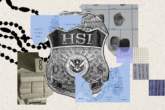August 31, 2022
Sharper: Homeland Security
Analysis from CNAS experts on the most critical challenges for U.S. foreign policy.
The Department of Homeland Security (DHS) is one of the United States' newest, but most pivotal federal government departments, charged with protecting national security since its creation in response to the terrorist attacks of September 11, 2001. From border security, to counterterrorism to national emergency management to maritime security and more, DHS components have operational responsibilities across a wide array of national security priorities. As the domestic security landscape evolves and grows in complexity, DHS faces challenges in implementing its authorities effectively and comprehensively. CNAS experts are sharpening the conversation around how the department can be better equipped to conduct its critical functions. Continue reading this edition of Sharper to explore their commentary, analysis, and policy recommendations.
Features
The Department of Homeland Security: Priorities for Reform
In the midst of a rapidly evolving security environment, the department should be reoriented in a way that best protects the United States from homeland security threats consistent with law, security and public safety needs, and the nation’s fundamental values. In this report, the first of a series of mission briefs on reforming DHS, CNAS Robert M. Gates Senior Fellow Carrie Cordero and former Executive Research Assistant Katie Galgano build on recommendations of areas where both the Biden administration and the 117th Congress should focus efforts related to DHS reform.
Beyond the L.A. Declaration on Migration and Development
Over the last decade, the United States and other countries in the Western Hemisphere have encountered an evolving set of irregular migration events. The United States and other Western Hemisphere countries are collaborating on a migration management strategy that addresses the increasing frequency and scale of irregular migration events stemming from a broader range of factors (like climate change). A new report from Cristobal Ramón proposes two intersecting sets of recommendations for the United States and for L.A. Declaration signatories that address the weaknesses in these policies.
Reassessing Homeland Security Intelligence
The discipline of intelligence has been a central element of the homeland security enterprise over the past two decades since the terrorist attacks of September 11, 2001. But since the creation of the Department of Homeland Security in 2003, the Office of Intelligence and Analysis (I&A) has often struggled to live up to this vision. It has found it challenging to influence and integrate intelligence-related activities across the components of DHS. A report from Christian Beckner provides the foundation for a detailed set of recommendations to reform I&A.
The Department of Homeland Security: Priorities for Reform
There is an opportunity to reform the Department of Homeland Security in a way that best protects the country from homeland security threats, consistent with law, security and...
Beyond the L.A. Declaration on Migration and Development
Over the last decade, the United States and other countries in the Western Hemisphere have encountered an evolving set of irregular migration events. During these events, a la...
Reassessing Homeland Security Intelligence
The discipline of intelligence has been a central element of the homeland security enterprise over the past two decades since the terrorist attacks of September 11, 2001. The ...
Events
A Conversation with DHS Deputy Secretary John K. Tien
The Department of Homeland Security has massive responsibilities to protect the country against a wide range of threats. On Friday, January 28, CNAS hosted Deputy Secretary John K. Tien in his first in-depth public conversation since stepping into his role, to discuss current homeland security threats and challenges, and, one year into the Biden administration, the department’s priorities for strengthening the effectiveness of its operations while adapting to a threat landscape that has evolved substantially since the department’s creation. Robert M. Gates Senior Fellow Carrie Cordero moderated the conversation.
A Conversation with FEMA Administrator Deanne Criswell
When major disaster strikes, American look to FEMA to support the response of their local and state authorities. On Friday, March 25, CNAS hosted FEMA Administrator Deanne Criswell in a conversation about preparedness for climate related disasters, pandemic response, and how FEMA's new strategic plan tackles these issues and more. Robert M. Gates Senior Fellow Carrie Cordero moderated the conversation.
Safe@Home | A Conversation with DHS Deputy Secretary John K. Tien
Carrie Cordero, John K. Tien
Jan 28, 2022
Safe@Home | A Conversation with FEMA Administrator Deanne Criswell
Carrie Cordero
Mar 25, 2022
Commentaries
Western Hemisphere Migration Is a Long-Term Challenge
"Large-scale migration events have been a core facet of life across the hemisphere in the latter half of the 20th century, write Carrie Cordero and Cris Ramón in Just Security. "Factors such as insufficient economic opportunities, cartel violence and civil wars in Central and South America prompted people to leave their countries in search of better opportunities and safety in other countries. Central American and Caribbean migrants, most prominently Cuban and Haitian, have all taken land and sea routes to reach the United States. In South America, families and individuals have fled dictatorships and civil wars to neighboring countries, with some, such as Colombians, traveling to the United States to seek safety."
Opportunity to Reform the Department of Homeland Security’s Biodefense Operations and Governance
"The present moment is ripe to reform biodefense efforts concerning homeland security," argue Carrie Cordero and Asha M. George in Lawfare. "First, the coronavirus pandemic and the war in Ukraine demonstrate both the actual harms and potentially devastating consequences of biological events. The sluggish initial U.S. response to the pandemic revealed the inadequacy of detection and mitigation measures embedded in federal government policies and practices. And given substantial debate regarding Russia’s biological weapons program and its suspected use of chemical weapons against its adversaries, the potential for the accidental or intentional release of biological agents exists in the present environment. Moreover, if Russia were to engage in biological warfare against Ukraine, that act could embolden other countries to develop and use such weapons in other conflicts."
How Cybersecurity Saved U.S. Democracy
"American elections are run locally; the U.S. federal government does not administer them and is not in charge of them," observes Carrie Cordero in The Center for International Relations and Sustainable Development. "The effort to protect the actual security of the 2020 election and counter post facto allegations that it was unsecure required a whole of nation effort that ranged from the Cybersecurity Infrastructure Security Agency of the Department of Homeland Security and other parts of the intelligence community to state and local election officials, but also included a range of private sector entities that facilitated the implementation of technical defenses."
Western Hemisphere Migration is a Long-Term Challenge
Addressing western hemisphere migration should be a national and international priority....
Opportunity to Reform the Department of Homeland Security’s Biodefense Operations and Governance
If Russia were to engage in biological warfare against Ukraine, that act could embolden other countries to develop and use such weapons in other conflicts....
How Cybersecurity Saved U.S. Democracy
In 2020, the threats compounded as compared to 2016....
In the News
Featuring commentary from Richard Fontaine, Carrie Cordero, and Christian Beckner.
Far-Right Militias Pose Greatest Threat to US National Security, Experts Say
Far-right militias pose the greatest threat to the national security of the United States, experts tell Newsweek. In stark language, they warned of the increasingly grave risk...
Homeland Security ‘Nerve Center’ Chief Seeks Broad Policy Sway
A low-profile office in the Department of Homeland Security can steer the Biden administration’s major decisions on immigration, cybersecurity, and other vexing issues. Much w...
‘Backwater’ Intelligence Office Faces Test Under Biden Nominee
I&A has also struggled with the second prong of its mission: making sure the federal government and its state and local partners are talking. While the FBI works with stat...
Electric Grid is 'Attractive Target' for Domestic Violent Extremists in US, Intel Brief Says
Domestic violent extremists will "likely continue" to plot and encourage physical attacks against electrical infrastructure in the United States, according to a recent Departm...
Thank you for registering! You will receive a confirmation email shortly. All CNAS events are free, open to the public, and viewable from cnas.org/live.
Stay up-to-date with report releases, events, major updates, and announcements from the Center for a New American Security.
More from CNAS
-
Securing U.S. Democracy Initiative
Beyond the L.A. Declaration on Migration and DevelopmentOver the last decade, the United States and other countries in the Western Hemisphere have encountered an evolving set of irregular migration events. During these events, a la...
By Cristobal Ramón
-
Securing U.S. Democracy Initiative
Perceptions of SafetyAs part of our Safe@Home forum and Securing U.S. Democracy Initiative, we partnered with the non-profit organization More in Common to gain a better understanding on what Amer...
By Carrie Cordero
-
Securing U.S. Democracy Initiative
The Coast Guard: “Always Ready,” Except for ChangeThe Coast Guard motto, “Semper Paratus,” translates to “Always Ready.” While this is true in the Coast Guard’s everyday emergency response and operations, which provide great ...
By James Valentine
-
Securing U.S. Democracy Initiative
From Mardi Gras to the Philippines: A Review of DHS Homeland Security InvestigationsAs it approaches 20 years since its creation, the Department of Homeland Security (DHS) is due for substantial updates in order to improve its ability to adapt to current and ...
By Carrie Cordero & Katie Galgano
















